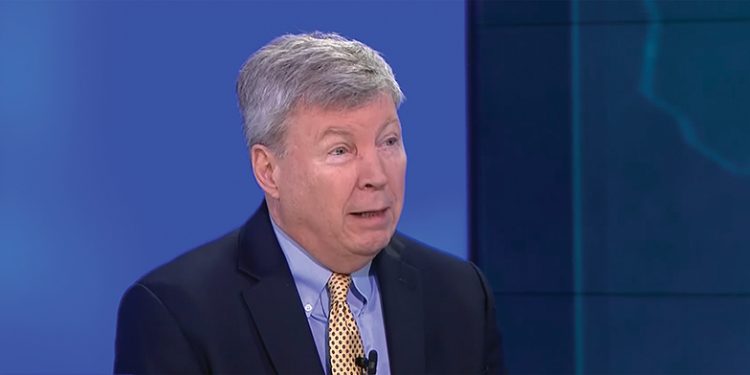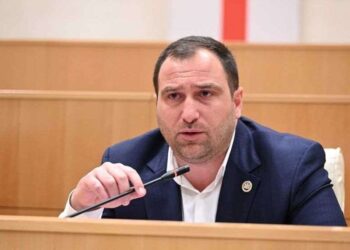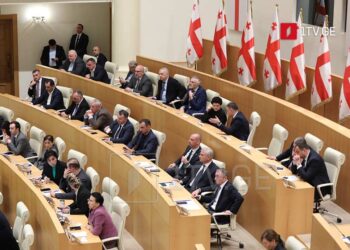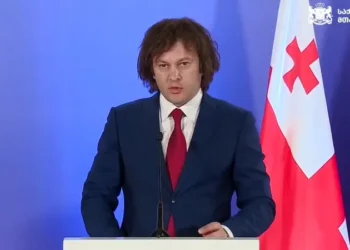On June 4, the Helsinki Commission held a congressional hearing to support Georgia’s sovereignty and democracy. Representative Joe Wilson led the session, hearing testimonies from key figures Ivane Chkhikvadze, EU Integration Program Manager at the Civil Society Foundation and Georgia Country Consultant at the European Endowment for Democracy; Natalie Sabanadze, Senior Fellow at Chatham House and former Georgian Ambassador to the EU; and William Courtney, Adjunct Senior Fellow at the RAND Corporation and former US Ambassador to Georgia. The hearing addressed recent events, such as Georgia adopting a Russian-style foreign agents law, the US announcing sanctions against those undermining democracy in Georgia, and a review of US-Georgian cooperation. Legislative actions like the MEGOBARI Act and the Georgian People’s Act, both aiming to impose sanctions on Georgian officials and review US-Georgia relations, were discussed. This week, Radio Free Europe/RL’s Georgian Service sat down with William Courtney to get his takeaways from the hearing.
“All four members of the congress, as well as the witnesses, shared unanimous concern about Georgia’s new foreign agents law, and the risk that the October parliamentary elections will be rigged, including by abusing said law to make it impossible, for example, for independent media to accept commercial advertising, or to disqualify some candidates for office, things like that,” Courtney tells us. “We only need to take a look at what happened in Russia, where the Kremlin, using a similar law and some others, such as the law on undesirable organizations, virtually wiped out civil society and Russian independent media. We don’t yet know exactly how the Georgian government is going to use or abuse the foreign agents law. But the pattern we see in Russia raises a lot of concern.”
We know how it unfolded in Russia, but how did Georgia get here? How has a staunchly pro-Western country found itself in this situation?
Shevardnaze and Saakashvili were both in power for about a decade. During Shevardnadze’s tenure, there were some hopes for reforms, and he did carry out some of them; Saakashvili did considerably more, including his anti-corruption reform. Georgian Dream…. Well, they have been talking about reforms. But in all three cases, they overstayed their welcome in power for too long, and turned more and more authoritarian to ensure they would stay in power. This in turn made them less and less popular. Georgian Dream, I think about one in five people support them in Georgia at this point, and it increasingly appears that Bidzina Ivanishvili, who has close ties with Russia, is planning on using the foreign agents law to rig the elections in October, to avoid defeat.
Let’s hope the elections are as free and fair as possible. But right now, we’re not so sure we expect that
Yet neither Shevardnadze nor Saakashvili embarked on a crusade against the West. Georgian Dream seems to be making that U-turn. Why?
Yes, I think it’s fair to say that both Shevardnadze and Saakashvili, whatever their shortcomings might be, were trying to escape Russia. But in the case of Georgian Dream, Ivanishvili doesn’t even hide his affiliation and interests with Russia. And while there were doubts from the beginning, now we’ve seen revealing signs that this is a pro-Russian billionaire, one who is willing to use his money and other resources to take the government in an anti-democratic direction. That’s a major concern for us. It’s a surprise, really, for many in Europe and in the United States. But Georgia turning away from the West really is happening, and it’s happening at a rapid rate.

Your quote during the hearing: “If the elections are rigged in a major way, then we might expect some sort of a revolution scenario.” What happens if they are rigged only just enough to tip the scales?
Then perhaps the risk of public unrest is lower. But let’s look at Georgia, Ukraine and Belarus – in all those cases, stealing elections played a key role in bringing out civil society. We will have to see what happens in these October elections, the extent to which the elections are rigged. But most observers believe that the foreign agents law is aimed at being an instrument that Georgian Dream can use to tilt the playing field, if not outright steal the elections in October.
You also said: “The West cannot be a major player here,” that we shouldn’t expect the Western cavalry to come and save the day. What is realistic to expect from the West, then?
It’s up to Georgians to decide what the reaction is going to be. Let’s look at the Rose Revolution, the Orange Revolution, Maidan, and the protests in Belarus – popular unrest was driven by the people themselves, while the West was on the margins. We’re likely to see the West be supportive of those who want to have free, fair elections. There can be more sanctions, depending on the extent to which the election is stolen. It’s difficult to predict at this point. I do believe that no one in the West thinks the West has much power to influence the outcome of the elections or how the foreign agents law is going to be implemented inside Georgia.
Most of those out in the streets supporting their country’s European future expected the West to do its bit, especially when it came to individual sanctions. Will they come? If so, when?
Let’s take the foreign agents law in Russia. The law itself aroused concern in 2012, but it was the implementation of the law that had the biggest impact: That independent media which were designated as foreign agents could not receive commercial advertising, that individuals who were tied to being foreign agents couldn’t run for election. A lot will depend on how Georgia’s version is implemented. But, probably, if the main aim of Georgia Dream is to reduce the risk of losing in October, we’re likely to see something like what Russia did. In Russia, implementing a foreign agents law in a cynical way wasn’t enough for the Kremlin, and in 2015 came the “undesirable organization law,” and it used the two of them together to wipe out civil society. We don’t know what path Georgia is going to take, but the path that we see in Russia certainly causes a lot of foreboding about what might be in Georgia’s future.
Most observers believe the foreign agents law is an instrument Georgian Dream can use to tilt the playing field, if not outright steal the elections in October
And at what stage do sanctions come into play?
Sanctions are preventive measures. Although Secretary Blinken made the announcement about travel restrictions a week or so ago, no restrictions have been made. The State Department will be waiting to see what happens and how things are implemented. These things are usually implemented after something happens, just as most of the sanctions on Russia were implemented after the full-scale invasion started on February 24, 2022.
That would mean that sanctions, by and large, are not preventive, but punitive.
Well, the purpose of sanctions is to raise the cost for Georgian Dream to take further repressive steps. So it’s to raise the cost of going further.
That means that those 84 people who voted for this law won’t be sanctioned until the law is put in motion and exploited? They’ve escaped punishment at this point, then?
It’s possible, but we don’t really know. Europe has not talked about sanctions as much as the US has; the German Ambassador said that the EU will not begin accession talks as long as the law is in force. So we’ll have to wait and see.
Does the EU stopping accession talks sound like a big deterrent for Georgian Dream? Is it not a blessing in disguise for them that they won’t have to make the reforms that Brussels is asking of them?
That’s quite possible. Looking back at December 2023, granting Georgia accession privilege, even as Georgia was moving backward, that was a calculated bet by a European Union that it could offer incentives and reverse the direction of policy in Georgia. That gamble did not pay out. Instead, Georgian Dream used the granting of candidate status to legitimize itself and say, “oh, we are moving towards Europe.”
They also said: “Not only are we moving to Europe, we are moving there on our own terms. They had to cede ground and that’s how strong we are.”
Yes. So the attempt to support Georgia’s accession was a good attempt, the intentions were good. But as the saying goes, the road to hell is paved with good intentions.
What do you think Georgian Dream’s conclusions would be of the June 4 hearing?
Georgian Dream is taking the actions it is taking with the purpose of staying in power, even though it has become unpopular. There’s not much the West can do that is going to overpower Georgian Dream’s motivation. They will probably try to find some ways to be careful and not become subject to too many sanctions, but they also show no sign of changing the direction they’re pushing the country in. In the last few days, we have seen thugs beating up civil society individuals and media representatives, we’ve seen one Georgian parliamentarian threatening to charge anyone who opposes the law with treason. That’s their direction, and whatever the West does, it doesn’t seem likely that that direction will change fundamentally.
What about the Megobari Act? It had an interesting combination of sticks and carrots, and caught a lot of people’s attention.
I’m with the RAND research organization, so I cannot comment on specific legislation. But I will say this: The focus in the West is really going to be what happens prior to the elections in October and the outcome of the elections. We in the West will be watching. Let’s hope the elections are as free and fair as possible. But right now, we’re not so sure we expect that.
Interview by Vazha Tavberidze














